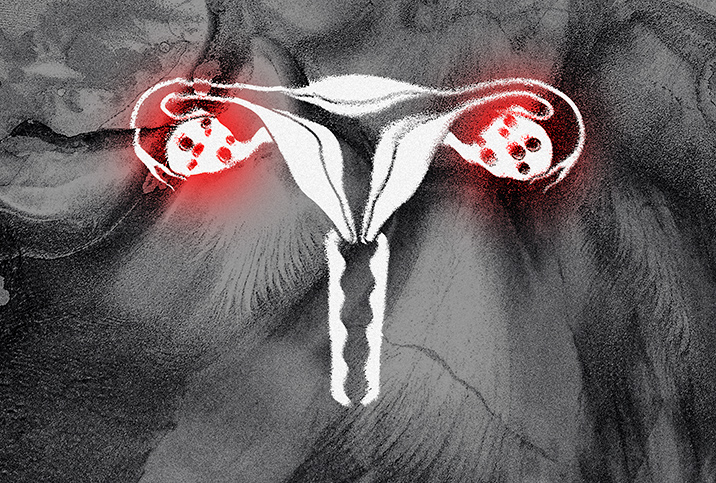Answering Your Questions About Platinum-Resistant Ovarian Cancer

While you probably know about ovarian cancer, you may be less familiar with the platinum-resistant kind. What has platinum got to do with ovarian cancer? Simply put, it's about the treatment type and how your body responds. According to a 2021 study published in the medical journal The Lancet, although oncologists can treat some cases of ovarian cancer with targeted and immunological therapies, platinum-based chemotherapy containing either carboplatin or cisplatin remains the backbone of treatment.
If your ovarian cancer recurs within a specific time frame of platinum-based chemotherapy, it is defined as platinum-resistant.
"If the time elapsed between receiving the last round of chemotherapy and the detection of relapse is less than six months, the patient is considered to be 'platinum-resistant,'" explained Soheila Borhani, M.D., a physician and cancer researcher at the University of Illinois at Chicago.
How often does platinum resistance occur?
Approximately 21,400 women were diagnosed with ovarian cancer in the United States last year. And a woman's lifetime risk of getting ovarian cancer is about 1 in 78.
"Initial treatment consists of surgery, usually in conjunction with carboplatin-based chemotherapy," explained Rachel N. Grisham, M.D., medical oncologist at Memorial Sloan Kettering Cancer Center. "While most women will respond to their initial treatment, the risk of development of recurrent disease remains high."
"Approximately 25 percent of patients with ovarian cancer show resistance to platinum-based agents from the very beginning," Borhani said. "And among the remaining 75 percent, most will develop resistance over time."
Even if the woman is initially sensitive to carboplatin-based chemotherapy, cancer can develop mechanisms of resistance, agreed Grisham. "Virtually all women with recurrent ovarian cancer will eventually develop platinum-resistant disease," she stated.
Are certain people more at risk for platinum-resistant ovarian cancer?
According to Borhani, the level of resistance to platinum-based drugs varies depending on the presence of specific genes and mutations.
"For instance, women harboring a BRCA mutation are more likely to be sensitive to platinum-based chemotherapy," Grisham added. "Conversely, tumor CCNE1 application is associated with resistance to chemotherapy."
Because certain genes are a predisposing factor for developing platinum-resistant ovarian cancer, Grisham stated that genetic testing is an integral part of ovarian cancer treatment and is recommended for all women at diagnosis.
What treatment options are left for individuals with this stage of disease?
"There are multiple options for treatment of platinum-resistant ovarian cancer, most commonly consisting of non-platinum chemotherapy, such as paclitaxel, pegylated liposomal doxorubicin, or topotecan, either alone or in combination with bevacizumab, but more options are needed," Grisham said.
However, both Grisham and Borhani stressed that platinum-resistant ovarian cancer remains an active area of research, and multiple clinical trials are ongoing.
For example, Borhani was part of a recent clinical trial that studied two distinct ovarian cancer cell lines (PEO1, OVCAR3). The study published in the journal Cell Death & Disease found that the cancer cells treated with a compound called STL427944 exhibit increased sensitivity to conventional chemotherapeutic treatments, including platinum-based agents.
Grisham described another clinical study in this area, which is still ongoing. "The Phase III EPIK-O study randomizes women with platinum-resistant recurrent ovarian cancer to either standard of care treatment with weekly paclitaxel or pegylated liposomal doxorubicin versus an investigational approach of the oral PARP inhibitor Olaparib, in combination with the oral PI3 Kinase Inhibitor Alpelisib (NCT04729387)," Grisham explained.
There are multiple research trials ongoing around the world. So, if you are a patient diagnosed with platinum-resistant recurrent ovarian cancer, you can speak to your cancer care team about studies you can participate in.
"Patients can find additional clinical trial opportunities by visiting ClinicalTrials.gov and speaking with their local oncologist. You can find the ovarian cancer clinical trials currently enrolling new patients at Memorial Sloan Kettering here," Grisham said.
Is there anything cancer survivors can do to prevent getting platinum-resistant ovarian cancer?
Borhani advised that, at present, not much can be done to prevent chemo-resistance.
"That said, experimental approaches based on alteration of the patient's genes, also known as gene therapy, have shown promising results in the lab," she added. "Further research is currently underway to bring them into use."
Unfortunately, because virtually all women with recurrent ovarian cancer will eventually develop platinum-resistant disease, Grisham advised that the best way to avoid it is through strategies that help to prevent the initial development of ovarian cancer.
"Genetic testing is our most powerful tool to prevent ovarian cancer," she stated. "All women with newly diagnosed ovarian cancer should undergo genetic testing to see if they harbor a BRCA mutation."
She explained that for the more than 15 percent of women with ovarian cancer who have a germline BRCA mutation, each of their children will have a 50 percent chance of also harboring the mutation.
"Genetic testing of potentially affected family members, in conjunction with a genetic counselor, can allow family members to have the option of prophylactic surgery to greatly decrease their risk of developing the disease," Grisham concluded.


















